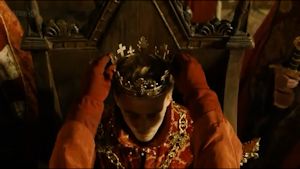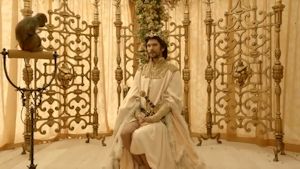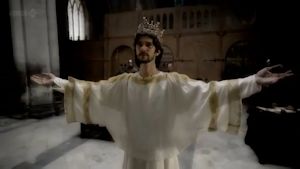TV Review: The Hollow Crown
 | | Uneasy lies the head |
This Friday in the U.S., PBS will be running the third and fourth episodes of its Shakespeare Uncovered series, which both deal with Shakespeare's second tetralogy of history plays--Richard II, Henry IV, Part 1, Henry IV, Part 2, and Henry V--better known as the Henriad. In anticipation of this, I managed to track down and watch last year's BBC Two production of the Henriad, called The Hollow Crown, which has yet to air on this side of the Atlantic. PBS has it scheduled to be scheduled, and I imagine Friday night's Shakespeare Uncovered will spark an announcement in the near future about when we can expect to see it. In the meantime, is this big budget adaptation of four separate plays worth roughly nine hours of your time? Does it offer anything new to Shakespeare's long history of film adaptations, or is it just another Shakespeare rehash that can be safely dismissed?
For this review, I will separate my thoughts into four sections. The first will deal with the first "episode," "Richard II," the second with both parts of "Henry IV," the third with "Henry V," and the fourth will discuss the series as a whole. Though I know few of my regular readers are fans of Shakespeare, I am going to operate under the assumption that you are at least passingly familiar with all four plays and that you've at least seen one of the two great film versions of Henry V. If not, you're welcome to continue reading, but I'm afraid many of my impressions will be lost on you.
Richard II
 | | I'm guessing that monkey is responsible for the diseases that eventually kill the next two kings |
The most poetic of Shakespeare's plays, in that not a single line of prose is spoken, Richard II is often overshadowed by the plays that follow it. The central problem in most adaptations of Richard II is that the usurping Bolingbroke--later King Henry IV--is often played by a powerful big-name actor that can stand toe-to-toe with whomever is cast as King Richard. This nearly always happens whenever the entire tetralogy is performed, as Henry IV is a major character in three of the four plays and directors can't resist having the same actor play him in each. Here, in The Hollow Crown, however, they are wise to forgo casting Jeremy Irons, opting instead for a more subtle actor in Rory Kinnear. Thus, this adaptation isn't torn between Richard's story and Bolingbroke's, and by keeping a laser-like focus on the character of Richard, it gives the play far more solid and poignant ground to stand on.
This is aided by Ben Whishaw's clever interpretation of the king. At first, he seems aloof, delicate, and slightly effeminate, similar to how Derek Jacobi played him on television thirty years ago, but unlike Jacobi's Richard, Whishaw never crosses the line into unsympathetic. Instead of laughing with glee upon hearing of Bolingbroke's departure from England and Gaunt's condition, for example, Richard is ever-so-slightly regretful, with Whishaw highlighting the king's chiding of young Aumerle and downplaying his seemingly cruel wish that Gaunt die quickly. Whishaw's Richard is also quick to explode into rage and anger that is viceral instead of righteous, and his descent into madness at the end of the play is extremely strong. This is the most multi-faceted and interesting Richard that I've ever seen.
 | | Kinnear's Bolingbroke is a reluctant usurper instead of just a young version of Henry IV |
Though he deliberately keeps himself out of the limelight, Rory Kinnear deserves high praise for his interpretation of Bolingbroke. At no point in the play does he seem eager to take the throne, and here, he seems genuinely interested in nothing more than reclaiming the inheritance Richard steals from him. When he wins the crown from Richard, he seems almost bewildered as to how it happened, covering his face with a stony glare of remorse. This leaves Northumberland to take the role of the real aggressor, the man who seeks to depose Richard, and the casting of David Morrisey (familiar to The Walking Dead fans as the Governor) accomplishes this task with ease.
The other two great performances worth noting are Patrick Stewart's Gaunt and David Suchet's York, Richard's two surviving uncles who manage to be fascinating characters despite not getting much time on stage. Patrick Stewart is relaxed and true to Gaunt early on, not standing out in any way until he finds himself on death's door. At this point, Stewart delivers Gaunt's famous "This England" speech, and he nails it. His confrontation with Richard is intense, ensuring that he remains a part of the narrative long after his death. York, though, is probably my favorite character in the entire play, the man who defends Gaunt and Bolingbroke to King Richard but is quick to condemn Bolingbroke for returning to England and taking up arms against the king. He later turns again, when he uncovers the plot to kill the newly crowned King Henry, now willing to sacrifice his own son out of loyalty to Bolingbroke. Suchet, then, is great casting, because he is an underappreciated character actor capable of showing how all these actions are actually consistent to the text.
Not all the casting is good, though. Probably the weakest actor of the lot is Clémence Poésy, who plays Richard's wife, Queen Isabella. Her scenes are all cut short, and her character is woefully underdeveloped. The fact that she is not shown much with Richard until their forced separation near the end, in addition to her weak development as a character, robs a potentially devastating scene of all its power.
 | | They definitely go overboard with the Jesus stuff |
As for the textual changes, most of the other trimmings and simplifications are justified. Gone is the confusion over Bagot's death and the repetitive nature of the scenes in which Gaunt tries to comfort Bolingbroke and the Queen's servant attempts to comfort Isabella. Instead, this adaptation is more heavy-handed in highlighting the themes that will run through the entire series. It does overdo the comparisons between Richard and Christ, not only by casting an actor who could easily pass for Jesus but by making dozens of other juxtapositions both subtle and blatant. There is a lot of other symbolism, too, such as Richard's pet monkey (which I love, by the way), a painting shown in the beginning that is echoed in the end by Richard's death, the genuinely disturbing executioner's mask that haunts Bolingbroke's coronation, and the crown itself.
However, the best thing about this adaptation is the presentation. There are a multitude of memorable and elaborate sets and costumes, and the cinematography is absolutely stunning, with sweeping shots, interesting framing, subtle dutch angles, brilliant lighting, and the frequent use of panoramic location shooting. The best example of this is the scene in which King Richard returns from his Irish adventure and is met with the litany of everything that is going wrong at home, leading up to his "let us sit upon the ground" monologue. The whole scene plays out on the shore during a rising tide, showing Richard playfully writing his name in the sand before throttling and nearly drowning Aumerle for trying to comfort him. This, combined with an excellent score, makes this version of Richard II genuinely epic. It is, all in all, the best adaptation of the play that you can find.
-e. magill 1/29/2013
|
|